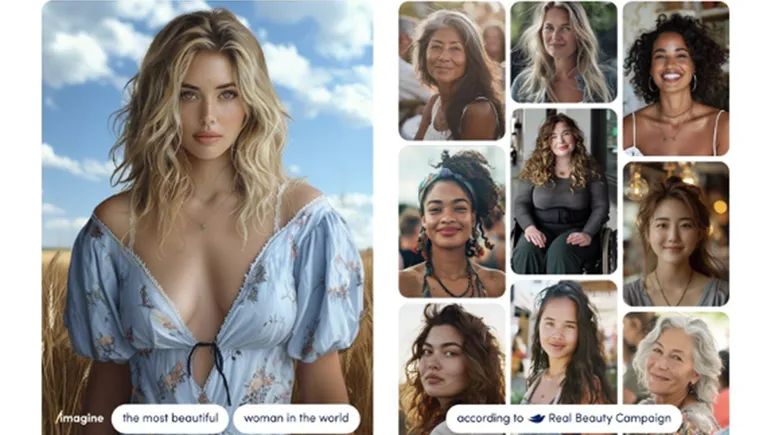Dove pledges to not use AI models in lieu of real women in its advertising

Dive Brief:
- Dove has pledged to not use artificial intelligence to represent women in its advertising and communications as part of its long-running Real Beauty platform that is celebrating its 20th anniversary this year, according to a news release.
- A new ad campaign, “The Code,” is set to a dramatic version of “Pure Imagination,” the song popularized by the film “Willy Wonka & the Chocolate Factory,” as women submit prompts to AI image generators to see what beauty looks like only to be greeted by unrealistic results. The video then shows Dove’s vision for what the technology could make, with a diverse array of women portrayed.
- The Unilever-owned brand has also established a set of Real Beauty Prompt Guidelines that aim to help users of generative AI create more representative images. The brand is also enlisting the help of celebrity ambassadors including Reba McEntire, Drew Barrymore, Beanie Feldstein and Marsai Martin to raise awareness.
Dive Insight:
Dove describes AI as one of the “biggest threats” to portraying real beauty in its announcement, drawing a line between the emergent technology and the airbrushed imagery it has fought against since launching its signature messaging platform two decades ago. A new ad illustrates the potentially harmful nature of current AI tools as women sit in darkened rooms and see text prompts such as “a gorgeous woman” and “perfect skin” surface cartoonishly perfect results while a somber take on “Pure Imagination” swells.
All of the AI images that appear in the commercial were made with real generative AI tools, the company said. Brazil-based independent agency Soko developed the global marketing effort.
Dove is looking to differentiate from some beauty competitors by committing to not use AI-generated models in lieu of real women in its advertising moving forward. The Unilever mainstay believes AI could amplify the internet’s already negative impact on confidence, with nine in 10 women and girls surveyed by the brand saying they have been exposed to harmful beauty content online.
The press release and “The Code” ad also reference a forecast that claims 90% of online content will be AI-generated by 2025. A representative for Dove attributed the figure to author Nina Schick, who shared AI predictions as part of a CES panel discussion in 2023. Schick at the time said that 90% of online content may be at least partially created with AI by 2025.
“At Dove, we seek a future in which women get to decide and declare what real beauty looks like — not algorithms. As we navigate the opportunities and challenges that come with new and emerging technology, we remain committed to protect, celebrate and champion Real Beauty,” said Alessandro Manfredi, chief marketing officer at Dove, in a statement. “Pledging to never use AI in our communications is just one step. We will not stop until beauty is a source of happiness, not anxiety, for every woman and girl.”
At the same time, Dove acknowledged that generative AI adoption is becoming difficult to ignore outright amid a surge in interest in software like ChatGPT. An internal study revealed that 24% of U.S. women and 41% of U.S. girls agreed that using AI to create different versions of themselves can be empowering. Dove hopes it can steer these enthusiasts in the right direction with the launch of the Real Beauty Prompt Guidelines that share inclusive language to get the most out of popular generative AI programs such as Midjourney and DALL-E.
While Dove identified some progress in broadening definitions of beauty since 2004, it emphasized there is still much work to be done. The marketer in partnership with Edelman’s DXI division assembled a report, titled “The Real State of Beauty,” that revealed over one in three women would trade a year of their life to realize their ideal appearance. Researchers spoke with over 33,000 respondents while extensive surveys were conducted across 20 countries.



